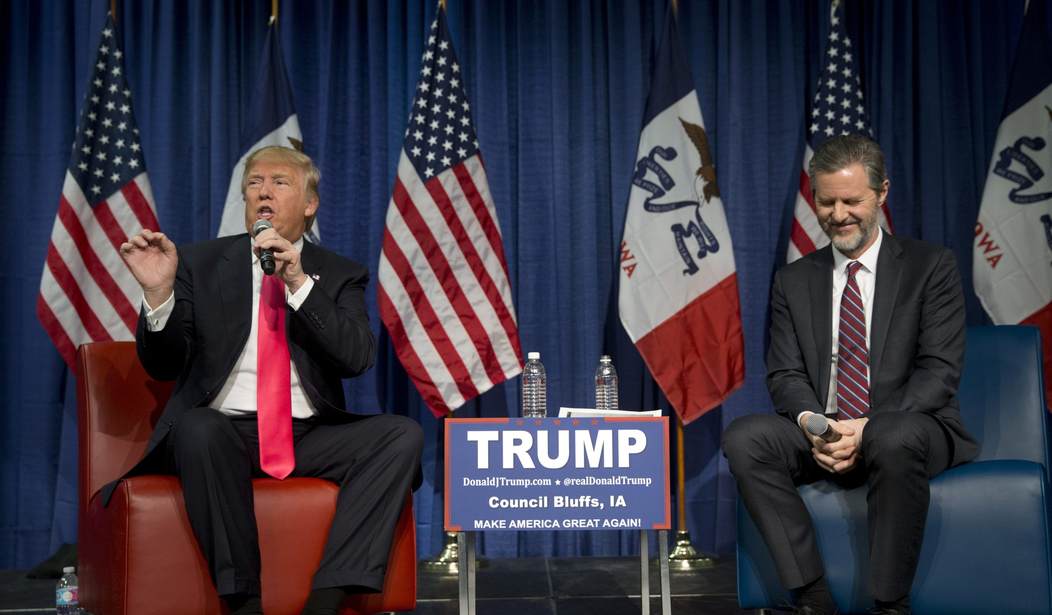Michael Gerson’s much-ballyhooed articles in The Atlantic and The Washington Post have made quite a splash, at least among evangelicals. Much of the response has been of the hand-wringing kind. As in, what right does Gerson have to throw evangelicals under the bus because of their support for Donald Trump? Well, count me as an evangelical who mostly agrees with Michael Gerson. I believe that the overall support for Donald Trump is a self-imposed obstacle to evangelicals’ ability to be a faithful witness to the gospel of Jesus Christ.
When Gerson, after listing just some of Trump’s sizeable moral failings, writes, “Yet religious conservatives who once blanched at PG-13 public standards now yawn at such NC-17 maneuvers,” I add my sad “Amen.”
To be clear, though, I do have some fairly substantial points of disagreement with Gerson, at least over what he’s articulated in his two recent essays. In fact, my points of disagreement may trump my agreement.
For starters, Gerson uses a very broad brush with which to paint all evangelicals who voted for Donald Trump. One of the problems with his essays is that he doesn’t allow space for evangelicals who are deeply embarrassed and disturbed by Trump’s “NC-17 maneuvers.” Instead, he implies that all “Trump evangelicals are best understood as conservative political operatives, seeking benefits for their interest group from politicians who are most likely to provide them.”
Almost every person that I know who voted for Trump is as disgusted by our president’s behavior and language as I am. And, just as importantly, they do not view President Trump as some kind of savior riding in on his horse to bully those who would bully us out of the public square. In fact, they do not want that. At all.
What they want is for President Trump to protect the lives of unborn children, defend the sanctity of marriage as defined by God, and provide a public voice that pushes back on the gender confusion being harmfully peddled by leftists. And my Trump-voting friends recognize that any moral stand Trump takes on these issues is a hypocritical stand. They’re not stupid.
They’re also not hypocrites, as Gerson claims.
Instead, they looked at what they believed were the only available options, held their nose, and voted for a man that disgusts many of them.
For the record, I disagree with my friends. I did not vote for Trump in 2016, and, unless something changes in his character, I will not be able to vote for the man in 2020. I remain #NeverTrump. Unlike my Trump-voting friends, I believe that they are overlooking another option—the choice of expressing “none of the above” with your vote.
You see, no one can simply vote against someone. As in, you can’t vote for Trump merely as a vote against Hillary. By voting for Donald Trump, you are claiming a level of support for the man, something I’m not comfortable with.
So, while I disagree with my Trump-voting friends, I also disagree with Gerson’s broad-brush assessment. I’m afraid that his extreme bifurcation is only going to serve to create even more distrust in our society. Which, frankly, is what enabled Trump to win the presidency to begin with.
More importantly, I find Gerson’s statements about evolution, abortion, and same-sex marriage in reference to evangelicalism woefully uninformed and lacking any theological substance.
Gerson dismisses any evangelical who opposes the belief that Darwinism is an unassailable doctrine as lacking in intellectual acumen. Failure to embrace evolution has caused people to distrust Christianity, in his mind, when, in fact, having your epistemic feet cemented into any current scientific theory is the foolish position. Thomas Kuhn’s The Structure of Scientific Revolutions would be a worthwhile read for anyone who believes that Darwinism is unassailable.
What Gerson fails to acknowledge is that it’s possible to disagree with an individual’s beliefs about science without categorically dismissing them. A world in which there is no room to allow for challenges to existing scientific paradigms is far scarier than a world in which Donald Trump is president.
In fact, what Gerson doesn’t seem to be able to comprehend is that the rejection of evangelical beliefs and ethics is what drove many of them into the arms of Donald Trump. As long as mainstream tastemakers and thinkers continue to scoff at adherence to the Bible’s teachings on the origin of life, more evangelicals are going to count themselves as marginalized people who can’t trust those in the self-proclaimed mainstream. This belief is provided support by Gerson’s dismissal of evangelicals’ views on abortion and same-sex marriage. Gerson writes:
Rather than choosing their own agendas, evangelicals have been pulled into a series of social and political debates started by others. Why the asinine issue of spiritually barren prayer in public schools? Because of Justice Hugo Black’s 1962 opinion rendering it unconstitutional. Why such an effort-wasting emphasis on a constitutional amendment to end abortion, which will never pass? Because in 1973 Justice Harry Blackmun located the right to abortion in the constitutional penumbra. Why the current emphasis on religious liberty? Because the 2015 Obergefell v. Hodges decision legalizing same-sex marriage has raised fears of coercion.
Think about what Gerson is actually saying. Condescendingly chiding evangelicals, Gerson insists that deeply held beliefs about the sanctity of life and marriage are to be set aside. In other words, evangelical concerns are not allowed a seat at the table of discourse. To him, we evangelicals are dull-minded children who mistakenly believe that society’s failure to adhere to biblical morals mean that they are out to get us. We’re a notch better than conspiracy theorists, in his estimation.
Well, the millions upon millions of dead children at the hands of the abortion industry would say that society is most definitely out to get them—if they were given a voice, that is. I know of a few Christian bakers who could help Gerson define “coercion.” At the moment, Miracle Hill, one of the largest foster care agencies in South Carolina, is in a legal battle for its life over its Christian identity. And the list goes on and on.
Gerson also fails to account for how deeply evangelicals believe in these issues. Abortion and same-sex marriage are not throwaway policy positions. Both are deeply rooted in what we believe the Bible teaches about the sanctity of life and the purpose for marriage (see Ephesians 5:31-32). To ask evangelicals to set aside our beliefs about either issue is insulting and reveals that Gerson’s morals are shaped more by society and less by the Bible.
In conclusion, while I too am saddened by evangelicals’ seeming wholesale support of a man like Donald Trump, it’s disingenuous to claim that the support is in any way monolithic. Likewise, insisting that evangelicals lay aside their deeply held beliefs is patronizing and reveals a lack of understanding of what drives those beliefs.
Gerson’s essays will accomplish the exact opposite of his purpose. He is only giving credence to evangelicals’ belief that broader society is unwilling to allow them a public voice. In fact, it’s essays like Gerson’s that will possibly cause me to change my mind and vote for Donald Trump in 2020.









Join the conversation as a VIP Member